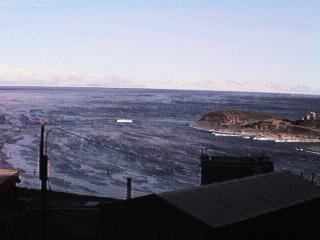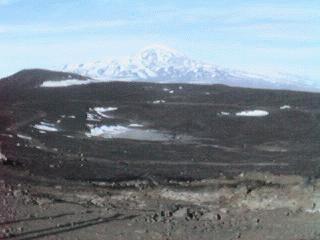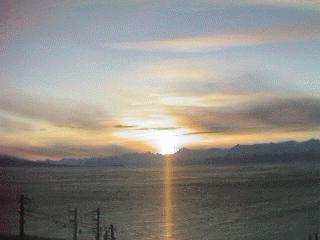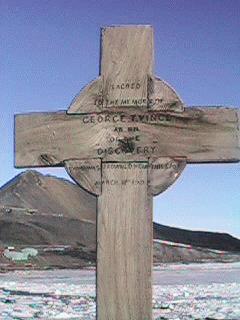

March 3rd
Why do I spend time at a keyboard when I have a day off? I have enough of computers on a daily basis at work. The old days of tracking satellites by turning knobs, and to some extent, the thrill of locking onto a satellite, have been replaced by those marvelous machines which make an oxy-moron out of the term, "user-friendly". To answer the question, "Why?", it's because I am incapable of letting today go by without writing something of the beauty over the last twenty-four hours.
Yesterday started off rather badly. We were supposed to lock onto and pass data through the Tracking and Data Relay Satellite (TDRS). Equipment problems prevented us from successfully completing this test. It was a frustrating day, and to make matters worse, I was stuck inside on a day when the weather was warm and beautiful, with a clear sky and light wind. Finally, after fourteen-and-a-half hours, I had the chance to leave the computers behind. I was tired, but seeing several people at Hut Point compelled me to walk there. At 10:30 PM, the sun had already set, but twilight colors continued to dazzle me.
All the troubles of yesterday vanished as I walked to Hut Point last night. The temperature was in the twenties; having no wind for the first time in several days gave the illusion of a heat wave. McMurdo Mall used to sell bumper stickers which said, "I brake for penguins". As I walked to the Point, the pick-up truck that passed me did exactly that. Near where the ice pier is located, two penguins on the access road were going for their midnight stroll. The women in the truck stepped out, and we followed the penguins very carefully and at a safe distance from them. Laws protecting penguins from being harassed by people are strict and the fines are stiff.
The group of eighteen penguins which have been at Hut Point were still there, staying in the same spot. According to other people, they are molting their Summer feathers for Winter ones. Last week when I was there, one single penguin went to a small patch of ice near the water's edge. He was funny, because he kept loosing his balance on the ice, and came close to falling a couple of times.
 As the sun moved behind Mt. Discovery, the reflections in the water
showed all the colors of the rainbow. There was one spot that looked like
clusters of grapes; another flat area mirrored pink and silver images of the
few
clouds. Standing on top of Hut Point Hill, one could see open water clear to
the
Northern horizon. A solitary seal swam by, and off in the distance I saw a
whale
breach. The sounds of waves crashing on the rocks broke the silence at Hut
Point. As the surf subsided back into the sea, the roar of a waterfall over
an
area about three feet deep and thirty feet long brought back memories of other
beaches and waterfalls. One of the men I talked to while at the Point said,
"What
a wonderful gift." Thank you God, for this gift.
As the sun moved behind Mt. Discovery, the reflections in the water
showed all the colors of the rainbow. There was one spot that looked like
clusters of grapes; another flat area mirrored pink and silver images of the
few
clouds. Standing on top of Hut Point Hill, one could see open water clear to
the
Northern horizon. A solitary seal swam by, and off in the distance I saw a
whale
breach. The sounds of waves crashing on the rocks broke the silence at Hut
Point. As the surf subsided back into the sea, the roar of a waterfall over
an
area about three feet deep and thirty feet long brought back memories of other
beaches and waterfalls. One of the men I talked to while at the Point said,
"What
a wonderful gift." Thank you God, for this gift.
 Back in my room, I just watched the sunset continue over the mountains. I
moved my pillow to the other end of the bed so I could better look out the
window. When I woke at 5 AM, still in my clothes, dawn bathed the mountains in
pink.
Back in my room, I just watched the sunset continue over the mountains. I
moved my pillow to the other end of the bed so I could better look out the
window. When I woke at 5 AM, still in my clothes, dawn bathed the mountains in
pink.
Earlier, last evening, the sea ice began to break open. In front of the Crary Lab, where I work, there was only about one hundred feet of open water near the shore at 7 PM. By the time I finished work, the ice had moved approximately one-fourth mile off shore. Small ice bergs, with a surface area about the size of a house, drifted by. It was amazing how much the ice had moved in such a few hours. By 10 AM this morning, McMurdo Sound, which is at least twenty miles across, had open water half that distance. Today the sky was clear, and the sun clearly illuminated the water and the Royal Society mountains. Often times, I have looked at the water in it various hues, and thought, "That's the color I want my next truck to be".
Today, I enjoyed many hours watching out the window. At sunset, another rainbow-like sundog was near the surface of the water. The wind has been blowing all day; now at 1 AM there is a drifting mist across the sea. Much of this journal will probably be about the penguins. They are part of my Antarctic experience. It is difficult to paint images with words on a computer screen. The beauty of this place is what causes me to try, and places me in front of a computer screen on my off-duty time away from the work computers.
March 5th

Yesterday the wind was very cold. Actual temperatures were near 0 degrees F., but the wind chill brought them to an effective -40 degrees. The scrolling weather channel on the local TV channel said the wind was 12 knots, but I doubt that, since one could almost fly. McMurdo Sound now is clear of ice all the way across.
Early this morning when walking back to the dorm after work, the sky was the darkest I had ever seen here. There was a heavy blanket of clouds that just hung near the top of the Royal Society Mountains and Mt. Discovery. The sun had set, but its orange glow filled the gap between the sea and the bottom of the clouds. I have heard astronauts describe their reentry as travelling on the inside of a neon tube. I felt like I was seeing this same neon tube around McMurdo Sound. (Surround Sound!) Time for lunch, and then back to work again.
March 7th
(Morning)
While walking back to the dorm at 1 AM, nature gave me another surprise - a full moon peaking through the heavy clouds! While I knew the moon was visible here, I hadn't seen it since I left the States in January. About an hour earlier, I had driven up to the hill to change a tape. Snow blew across the road, limiting visibility. Temperatures had dropped. Sitting in front of a wood burning fireplace, like the one I have at home, certainly would have been more comfortable. Although this was not the night to see moon light reflecting off of Mt. Erebus, just seeing the moon uplifted my spirits.
(Afternoon)
Gray sky, gray choppy sea. Windy. Cold. Stay inside until time to go to work. Read. Read what - have tons of books? Joseph Conrad's "The Mirror of the Sea" sounds good. Here am I, reading a book about sailing, looking out my windows at the hostile waters of McMurdo Sound, listening to the words of John Denver's Calypso.
Conrad, in his writing about sailors, echoes my sentiments about the earlier Antarctic explorers who would have used a GPS receiver, had they owned one, when searching for the South Pole, and who endured circumstances I only want to see in movies. "In his own time a man is always very modern. Whether the seamen of three hundred years hence will have the faculty of sympathy is impossible to say. An incorrigible mankind hardens its heart in the progress of it own perfectibility. How will they feel on seeing the illustrations to the sea novels of our day, or of our yesterday? It is impossible to guess. But the seaman of the last generation, brought into sympathy with the caravels of ancient time by his sailing-ship, their lineal descendant, can not look upon those lumbering forms navigating the naive seas of ancient woodcuts without a feeling of surprise, of affectionate derision, envy and admiration." One hundred years from now, when transportation to Antarctica is daily, or even hourly, I am sure the idea of having no planes for six months will make those people think we lived in primitive conditions.
Conrad describes the seas in its many colors and moods. Just watching the Ross Sea out of my window daily has given me a new prospective of how quickly and dynamic the sea can change. I have no idea the number of different shades of blue I have observed. The sea reflects all colors of the rainbow, and the waves are but a window into the dynamics of Mother Nature. Conrad refers to the sea as living being. Perhaps it is. Once, a friend of mine told me that the Earth feels man's presence, and sometimes responds with peace and beauty, but sometimes retaliates with hurricanes, floods, volcano eruptions, earthquakes, etc. Who am I to argue that concept. The Almighty Creator, if He can give me life, could He not give a spirit and/or life to a rock, or a mountain, a galaxy, or the sea?
A few more pages of Conrad triggers other thoughts: "It was somewhere near the Cape--The Cape being, of course, the Cape of Good Hope, the Cape of Storms of its Portuguese discover." Having worked nearly eighteen years working on NASA contracts, my image of The Cape is where the Apollo moon rockets were launched, and today's space shuttles are launched.
March 8th
As with any job, there are days of job satisfaction, and there are others that are very frustrating. Today was frustrating. We are working long hours, and it seems that the people at Wallops are placing an extra burden of demands on us. Tomorrow, we have to repeat last Saturday's TDRS test. That in itself isn't so bad, because we now understand the cause of the problems we encountered, and have more confidence that our test will be successful. But this test conflicts with our normal satellite tracking operations. Somehow, we will juggle everything and make it happen.
Next week, a medical evacuation (medevac) flight is coming to McMurdo to take a sick man out. There are rumors of incoming mail. The thought of hopping that plane out of here has probably occurred to most of us.
This afternoon, I had about a two hour break. The weather is warm, the Royal Society Mountains are clear, and the sea is an aqua blue. (Isn't it ironic, to describe the sea by a using a Latin-based word that means water? - The sea is the color of water!) To sulk in my room would have only wasted two hours.
"I wonder if the penguins are still at Hut Point", I thought. Walking fast and furiously, I kept thinking that I didn't need this frustration, and it wouldn't bother me very much to catch the medevac flight.
How can words paint the water and ice? Cameras and artists can't capture the view as well as the human eye. Translucent, all shades of blues, grays, sometimes still - mirror like; a minute later, ripples from the wind. There were paddies of ice, sheets, and clumps, with larger frozen waves bordering honey-combed natural stained glass patterns. Depending upon the direction of view, the water was dark gray, stormy, or calm and teal green, or gold and silver from sun reflections.
Eleven penguins remained in the small colony, laying down or standing on the same rocky hillside. It looks like they are nearly finished molting. Two others frolicked on the ice shaped like cumulus clouds. Being careful not to disturb them, I photographed them until I ran out of film. Of all the penguins I have photographed, these two may be in my best shots. One was having a bad hair day!
Higher up on the hill, one lone penguin facing the water acted as a sentential. He warned the others of my presence by a cawing sound. Concealed in the rocks, he was probably watching for seals. A few minutes later, when I was standing on Hut Point Hill, he cawed again, as an emperor penguin broke the surface.
Once, I had seen an emperor penguin through a telescope, perhaps a mile out on the ice. I had never seen one up close in Antarctica. At first, I just saw a small gray movement on top of the water. I thought it was a seal. Grabbing the binoculars, I saw his distinctive yellow markings as he surfaced. What a thrill!
Within a few seconds of the emperor diving, I saw a seal that came up for air, took a couple of deep breaths, and submerged. He was facing the emperor. After that, I didn't see any more action, but I wonder what happened, as I wonder what has happened to some of the adelie penguins. Today I saw fourteen; last week I saw as many as twenty.
 The George Vince memorial cross on top of Hut Point Hill has a sign that
he fell into the water, and died, on March 11, 1902. He was a member of the
Discovery Expedition. Three days away from 94 years ago I visited this site.
There are greater concerns in life than tight schedules. How little does it
matter
in the Overall scheme that I had job frustration? We all do, one time or
another.
The penguins aren't worried about tracking satellites. But they are concerned
about seals and survival.
The George Vince memorial cross on top of Hut Point Hill has a sign that
he fell into the water, and died, on March 11, 1902. He was a member of the
Discovery Expedition. Three days away from 94 years ago I visited this site.
There are greater concerns in life than tight schedules. How little does it
matter
in the Overall scheme that I had job frustration? We all do, one time or
another.
The penguins aren't worried about tracking satellites. But they are concerned
about seals and survival.
Walking back from Hut Point, my thoughts were not on flying out on the medevac, but that if I left early, I would have greater regrets of cheating myself out of the Antarctic experience. I would have felt that I had given up. That would be an even greater regret.
March 9th
Dave and I were successful in flowing data through the TDRS!